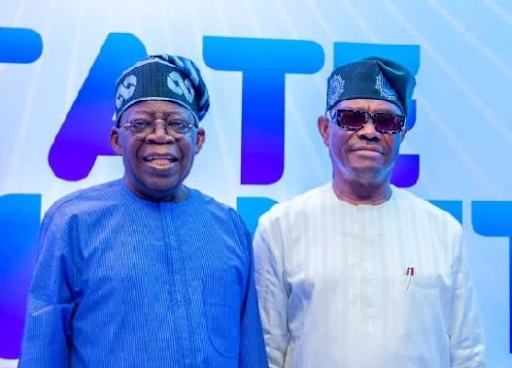The Political Gamble: Tinubu’s Test of Wike’s Loyalty
The grand halls of the Presidential Villa hummed with the echoes of power, the air thick with the scent of political intrigue. It was a night unlike any other—Eid had drawn the nation's elite to the heart of the Federal Capital Territory, where alliances were forged, and destinies decided.
At the helm of this theater stood President Bola Ahmed Tinubu, his gaze sharp as a hawk’s, his mind a labyrinth of strategy. Before him, the ever-defiant Nyesom Wike, a man of bold ambitions, clad in the confidence of a warrior, stood poised. The FCT Minister had come with a plea—a bold request to break free from the shackles of the Treasury Single Account (TSA), a move that would grant him unprecedented financial flexibility to reshape the capital’s landscape.
Tinubu leaned back, fingers steepled beneath his chin, his eyes studying Wike’s every move. The silence between them was thick with unsaid words, a tension electric enough to ignite the very air.
“Ah, Wike,” Tinubu finally said, his voice laced with amusement and hidden intent. “You ask for freedom, but at what cost? Will this liberty serve the people—or only fuel your own power?”
Wike did not flinch. His voice, firm as iron, carried the weight of his conviction. “Mr. President, I seek only to build. The people deserve more, and bureaucracy is the enemy of progress. Let me act. Let me deliver.”
A slow smile curled on Tinubu’s lips. He saw the fire in Wike’s eyes, the determination of a man unwilling to be chained. But politics was a game of power and loyalty, and Tinubu, a grandmaster in the art, knew the stakes well.
“Would this move favor my party?” Tinubu mused, his tone suddenly calculating. “Would the APC gain a stronger foothold in the FCT? Or would this be your Trojan horse, a gift to your own PDP brethren?”
Wike hesitated, the weight of the question pressing down like an anvil. And then Tinubu delivered the blow—sharp, cutting, but laced with jest.
“If this works too well in your favor, Wike, you might just lose your job.”
The room, filled with dignitaries and officials, burst into knowing laughter, the tension momentarily broken. Wike, ever the tactician, chuckled as well, but his mind raced.
“Okay, Oga,” he said, his grin masking the wheels turning within. “We settle that.”
And so the dance continued. Wike moved with precision, executing policies that revolutionized the FCT. Roads once forgotten were reborn. Hospitals, abandoned to decay, stood tall with new life. Schools flourished, teachers empowered, and the people of the capital felt the winds of change.
But beneath the surface, whispers grew.
Would Wike’s triumph be his downfall? Was he an ally to Tinubu—or a rival lying in wait? The opposition murmured, questioned, debated. His loyalty was both his shield and his sword, a delicate balance upon which his fate rested.
And as the city rose under his watch, the nation watched too, enthralled by the unfolding drama. Would Wike prove himself a loyal steward of the FCT—or was this the beginning of a grander, more dangerous game?
The answer lay in the days to come, in the choices yet to be made. But one truth remained undeniable:
In the high stakes of Nigerian politics, every move was a gamble—and only the shrewdest survived.








0 Comments